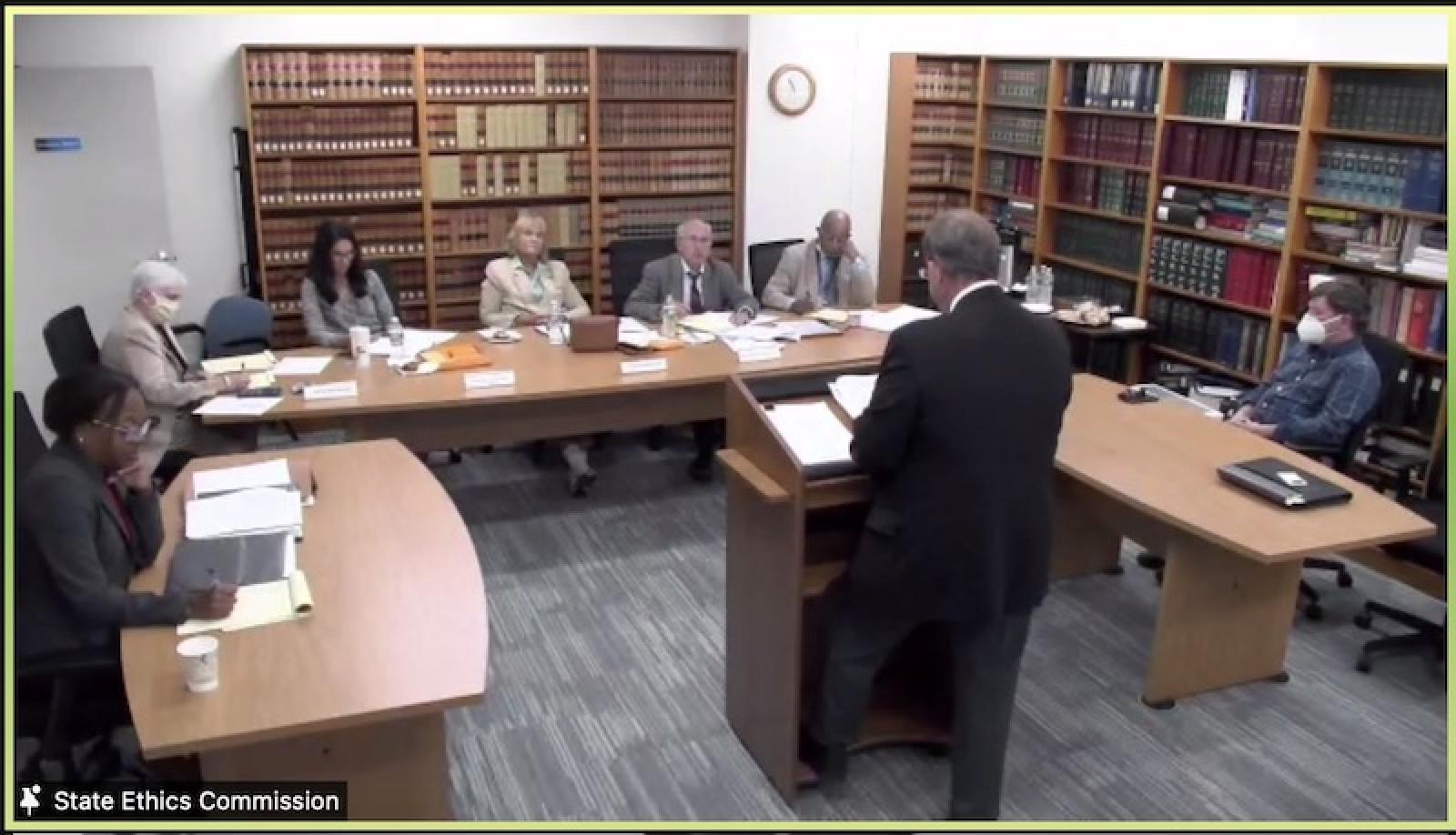Capping a months-long hearing process on Sept. 8, the State Ethics Commission heard closing arguments in the matter of Aquinnah selectman Gary Haley, who is under scrutiny for allegedly violating state conflict of interest laws when he performed work for the town four years ago.The commission will next delibrate the case at a future meeting.
Mr. Haley, now in his third term as an Aquinnah selectman, is a master electrician by trade. He has been cited by the State Ethics Commission, a state agency with the power to adjudicate and enforce state conflict of interest and financial disclosure laws, for collecting $17,000 from Aquinnah after performing electrical work for the town in 2018.
In his work on a job to bury cables and conduit as part of the town project to beautify Aquinnah Circle near the Gay Head Cliffs, the ethics commission claims among other things that Mr. Haley overbilled the town, appointed himself as a project manager and approved his own invoices to the town for work relating to the project.
Candies Pruitt, prosecutor and counselor for the state, reiterated these claims in her closing argument. Mr. Haley’s attorney Richard Gross, based in Aquinnah, maintained that no contract was signed between Mr. Haley and the town, he had no knowledge of the presence of his own invoices in the packet he approved as selectman and the state had offered no proof he overbilled the town.
“To sum up — no contract, no knowledge and no proof,” Mr. Gross said. “And thus no case.”
Mr. Gross focused on testimony from the town administrator and other town employees and officials in his argument, claiming steadfastly that Mr. Haley operated in good faith four years ago.
He said Mr. Haley volunteered to perform the work in an emergency situation, working to help remedy a trench created by other contractors in their work on the project.
“This trench would have remained open, creating a dangerous situation,” Mr. Gross said.
During proceedings of the hearing in June, attorneys questioned John Dumas, an employee of Eversource, and Paul DeBettencourt, an electrical contractor hired by Eversource to work on the Aquinnah Circle project. Cross examinations of Mr. DeBettencourt became combative during the hearing, and in his closing argument, Mr. Gross claimed Mr. DeBettencourt had a clear bias against Mr. Haley. Mr. Gross, calling for both testimonies to be disregarded.
Mr. Gross also argued, relying on testimony from town administrator Jeffrey Madison, that Mr Haley never entered into a contract with the town for the work, only sending an invoice after his efforts on the project exceeded his initial expectations.
“He and Haley both swore that they never entered into a contract,” Mr. Gross said.
Additionally, Mr. Gross underscored claims that Mr. Haley had no knowledge of what he was approving when he approved his own invoices for the project, billing the town $17,000. He evoked testimony from town accountant Emily Day in June, and said she should have flagged the invoice somehow in the packet of nearly 200 other bills.
“Haley had no knowledge he was signing his own invoice,” Mr. Gross said.
Last, Mr. Gross argued that Mr. Haley billed the town fairly and in accordance with the work he performed on the project.
“Haley’s invoice fairly reflects the work done by him and his assistants,” he said.
Mr. Gross called for the ethics commission to dismiss the case.
In her closing statement, Ms. Pruitt argued Mr. Haley placed himself in position to pay himself with town money.
“This is a case about self-dealing, self-enrichment and fraud,” Ms. Pruitt said. “He was uniquely positioned to enrich himself, and he did.”
She argued that Mr. Haley gave an estimate to the select board before he performed any work on the project, adding that doing so was clearly not the action of someone who was volunteering in an emergency as he claimed.
Ms. Pruitt also called back to evidence she introduced earlier in the hearing, raising questions of credibility. During proceedings in June, she scrutinized Mr. Haley’s claim that he paid a woman named Justina Jenkins and her boyfriend for work performed during the project under his supervision. Ms. Pruitt alleged that Mr. Haley had no contact with anyone named Justina Jenkins except by email, and said prosecutors obtained evidence that a gmail address under the name of Justina Jenkins was only created long after the work was performed.
In her closing argument, she said the work was likely performed by Kristina Metros, a relative of Mr. Haley, and her boyfriend.
“Justina Jenkins does not exist,” Ms. Pruitt said. “But Kristina Metros does.”
Ms. Pruitt called for a civil penalty against Mr. Haley.
The State Ethics Commission entered into an executive session following the closing arguments, when it began deliberations regarding the hearing. In a Sept. 8 email to the Gazette, ethics commission public information officer Gerry Touti wrote that deliberations have been continued to the next commission meeting yet to be scheduled. When the commission concludes deliberations on the matter, it is required by law to publish its decision within 30 days, Mr. Tuoti wrote.





Comments
Comment policy »